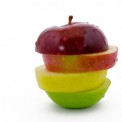Take Your Vitamins
10.15.12
Our bodies need vitamins to grow and develop normally. But recent studies show that less than one third of Americans are getting the recommended five servings of fruits and vegetables each day. You can usually get all your vitamins from the foods you eat. In fact the best way to get enough vitamins is to eat a balanced diet with a variety of foods, although at times you may need to take a multivitamin. Registered Dietitian Andrea Vintro of NYC’s Nutrition Energy explains the importance of some vitamins you may not be getting enough of and the foods that are rich in them.
Vitamin B12 helps maintain the health of nerves, red blood cells, and the DNA in all of our cells. B12 deficiency can cause tingling of the nerves in hands and feet, as well as a type of anemia that reduces the amount of oxygen carried in our blood, making us feel weak and tired. The best sources for B12 are beef liver and clams, but all other animal products are good sources. Processed grain products like cereals and breads can be fortified with B12, as well as soy products like soy milk.
Quick Tip: Get your daily serving of B12 with just one ounce of salmon or two eggs and one cup of yogurt.
Folate – also known as folic acid in its synthetic form – is heavily involved in the rapid cell division and growth of new cells, making it extremely important for a growing baby during pregnancy. Deficiencies in the mom at critical points early in pregnancy can cause severe birth defects. Also involved in the health of DNA in all cells, scientists are looking at folate’s role in cancer prevention.
Natural folate is plentiful in beans – such as lentils, kidney beans and pinto beans – leafy green vegetables – like spinach and greens as well as asparagus, broccoli, and orange juice. Many processed grain and soy foods were fortified with folate in the 90s, to help reduce the nation’s rate of spina bifida – the birth defect associated with folate deficiency. This means many breakfast cereals, breads and soy products are also great sources. But be careful when doubling up with a folic acid supplement, especially if you’re postmenopausal. Too much folic acid can mask vitamin B12 deficiency, because supplementation can correct an anemia caused by B12 deficiency. Bottom line if you are considering pregnancy, take a prenatal vitamin – this ensures you’re getting a good level of this vitamin.
Quick Tip: Get your daily serving of folate with ½ cup of cooked spinach, ½ cup cooked lentils, ¼ cup of peanuts, and one cup of cantaloupe.
Vitamin D – also known as the sunshine vitamin because the sun’s rays triggers its synthesis in our skin –less commonly occurs naturally in foods. Small amounts are found in fish and even smaller amounts in mushrooms, but the majority of dietary D we get comes from foods fortified with the vitamin, such as milk, soy products, and processed grains including breads and cereals.
We’ve known vitamin D’s critical role in bone health for many years, but more recently, its role in sustaining a happy mood and in cancer prevention is getting more notoriety. In addition, scientists are studying vitamin D for connections to chronic diseases such as diabetes, hypertension and autoimmune disorders such as multiple sclerosis.
There are some reasons you should consider taking a supplement for vitamin D. If you’re at risk for skin cancer, use lots of sunscreen, work in an office from sun up to sun down or live in the northern latitudes, you should probably consider a supplement.
Quick Tip: Get your daily serving of vitamin D in a 2 to 4 ounce trout; or try 2 cups of milk, 1 cup of D-fortified orange juice, 1 serving vitamin D fortified breakfast cereal, 2 eggs, and 6 ounces of shitake mushrooms.
Vitamin E boosts the immune system and acting as an antioxidant to squelch disease-causing free radicals. Vitamin E has been touted to help with everything from producing beautifully clear skin to preventing heart disease. We do know that an adequate intake of vitamin E helps us fend off viruses and bacteria that can make us sick, as well as keep the blood vessels healthy, reducing risk of cardiovascular disease.
Since it’s a fat soluble vitamin, E is found in the fatty portion of foods – primarily plant fats such as sunflower, safflower and nut oils.
Quick Tip: Get your daily serving of vitamin E in one ounce of almonds, one papaya or mango, one cup of cooked Swiss chard, or one tablespoon of safflower oil.
Vitamin A can be found in foods such as carrots and many deep yellow fruits and veggies, such as sweet potato, mangoes, pumpkin, peppers and apricots. These foods have loads of beta-carotene that your body transforms to active vitamin A, critical for good vision. Vitamin A is also heavily involved in the maintenance of cell growth required to maintain the health of organs such as your heart, lungs and kidneys.
Quick Tip: Get your daily dose of vitamin A with one sweet potato; or try one cup of cantaloupe, ½ cup of cooked kale, and one ounce of real cheese.
Written by: Andrea Vintro, MS, RD, CSSD, LD






